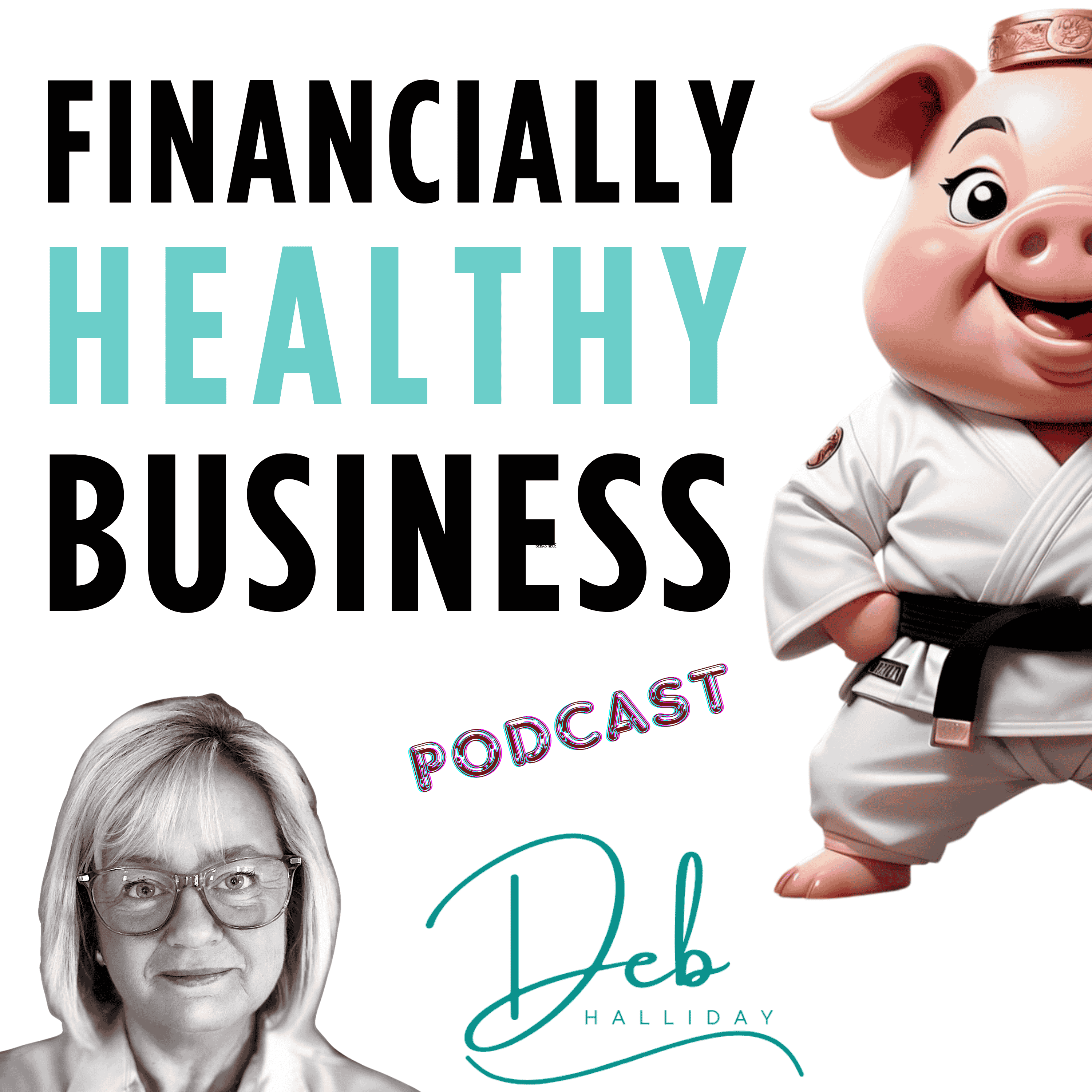From Crisis to Control: Empowering Your Business through Planning
In this episode, we’re tackling a subject that’s often ignored—until it’s too late: contingency planning.
I’m Deb, a Profit First Professional, and I’m here to show you how building a safety net for your business doesn’t mean expecting the worst—it means leading with foresight and calm.
From cash buffers to revenue resilience strategies and personal emergency plans, I walk you through three key types of contingency planning that will give you greater peace of mind and help your business withstand the unexpected.
You’ll hear the story of Linda, a client who was nearly derailed by a series of challenges—but who turned it all around with a clear plan in place. Because the truth is, being prepared isn’t being paranoid—it’s being powerful.
About the Podcast:
This episode of the Financially Healthy Business Podcast focuses on a mindset shift every business owner needs: preparedness as a form of power.
I’ll share how putting a simple contingency plan in place can reduce anxiety, protect profits, and keep you grounded—even when things go off track. With clear examples and practical advice, we’ll look at how you can start building your own safety nets today—without overcomplicating the process.
You’ll come away knowing exactly how to build a financial cushion, protect your income, and support yourself personally in case life throws you a curveball.
Each 15–20 minute episode in this podcast series is designed to help you move from stress to strategy, from reaction to resilience—so you can build a business that supports the life you want.
Plan ahead. Stay in control. Lead with confidence.Takeaways:
- Contingency planning is essential for maintaining peace of mind in business operations and avoiding crises.
- Establishing a cash buffer plan can significantly enhance financial security during unexpected downturns.
- Revenue resilience planning allows business owners to adapt quickly to income fluctuations and client losses.
- A personal emergency plan ensures that business operations continue smoothly in the owner's absence, protecting overall stability.
- Preparedness in business fosters a sense of calm and enhances decision-making abilities during challenging times.
- Being strategic and responsible in planning for uncertainty empowers business owners to lead confidently into the future.
Links referenced in this episode:
Companies mentioned in this episode:
- Accounts Ladies
- Accounts Office Academy
Transcript
Financially Healthy Business Podcast for business owners who want the confidence on cash flow that supports the life they actually want to live.
I'm Deb Halliday, Profit first, professional founder of award winning accountancy practice the Accounts Ladies and the Accounts Office Academy and author of how to Build a Financially Healthy Business. Learn how to take control of your finances, reduce stress, and grow sustainably because your business should support your life, not consume it.
Let's get started. I'm Deb Halliday and you're listening to the Financially Healthy Business Podcast.
This is episode 11 in our series and today we're covering a topic that's not talked about enough, but absolutely essential for peace of mind in business.
Hi Contingency Planning if the idea of an emergency expense, a lost client or a slow month sends you into panic mode, then this episode is going to help you feel calmer, more prepared and back in control. Because when you plan for the worst, you can lead with confidence no matter what actually happens.
Why you need a Contingency plan let's face it, business isn't always smooth sailing. At some point you will experience the quiet season, an unexpected tax bill, a tech meltdown, or a personal situation that pulls you away from work.
Without a plan, these things become crises. With a plan, they become manageable. Contingency planning isn't about expecting the worst, it's about making sure the worst doesn't wipe you out.
It's how you protect your profit, your pay and your peace. Case Study Linda Flash Freeze Let me tell you about Linda, a client of mine who ran a home based candle business.
One winter her supplier had a stock issue. Then the courier froze deliveries. Then two large clients cancelled just before Christmas. It was a cash flow disaster.
And because Linda didn't have a buffer or backup plan, she ended up borrowing just to get through the month. After that we worked together on a simple contingency strategy.
She built a business emergency fund, she created a short term pivot plan, and she added a digital product as an alternate income stream. Six months later when another delay hit, she was covered. No panic, no debt, just a clear plan and calm execution.
The three Types of Contingency Plans here's what I recommend every business owner has in place. First, cash buffer plan aim to set aside one to three months of operating costs. Start with 5 to 10% of income into a contingency pot.
Label it clearly and don't touch it unless needed. Second Revenue Resilience Plan Ask yourself if your biggest client left tomorrow, how would you replace that income? Could you pivot temporarily?
Offer something new or downscale costs. What are your backup income streams? Plan for flexibility now so you're not reacting later. Third, personal emergency plan.
If you had to step away from your business for two weeks, what would happen? Who would handle customer emails or orders? Do you have instructions written down? Could someone step in or support remotely?
This isn't just about business, it's about protecting you. Prepared is not paranoid A lot of people resist contingency planning because it feels negative, like you're inviting problems by preparing for them.
But it's the opposite. When you've got a backup plan, you feel calmer. You make smarter decisions. You bounce back faster. You lead with confidence.
Being prepared doesn't mean you're paranoid. It means you're responsible, strategic and future focused. This is how serious business owners operate and you are one. Here's your task this week.
Answer the three big what's your cash buffer goal? What's your short term income pivot plan? What happens if you need time off? Start building your contingency pot.
Even 1% of revenue each week adds up and gives you breathing room. In the next episode, we'll talk about the bigger picture. Deciding what's next for your business. Should you stick, scale or sell?
It's one of the most important questions you'll ever ask, and you'll feel much more confident answering it after today's episode. Thanks for joining me. I'm Deb Halliday. And remember, when you plan for uncertainty, you lead with strength. See you next time.
Thanks for tuning in to the Financially Healthy Business podcast. If today's episode helped you take a step closer to building a business that supports your life, share it with a fellow business owner.
Follow the show or leave a review. It all helps to get the message to the people that need it.
Head to how to build a Financially healthy Business Co UK and explore the tools, resources and online programs. You didn't start your business just to survive, you started it to thrive.

